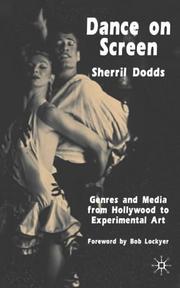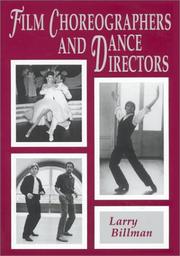| Listing 1 - 10 of 37 | << page >> |
Sort by
|

ISBN: 1403941459 Year: 2004 Publisher: Houndmills, Basingstoke, Hampshire ; New York : Palgrave,
Abstract | Keywords | Export | Availability | Bookmark
 Loading...
Loading...Choose an application
- Reference Manager
- EndNote
- RefWorks (Direct export to RefWorks)
'Dance on Screen' is a comprehensive introduction to the rich diversity of screen dance genres. It provides a contextual overview of dance in the screen media and analyses a selection of case studies from the popular dance imagery of music, video and Hollywood, through to experimental art dance. The focus then turns to video dance, dance originally choreographed for the camera. Video dance can be seen as a hybrid in which the theoretical and aesthetic boundaries of dance and television are traversed and disrupted.
Periodical
Year: 1998 Publisher: NY [i.e. New York] NY : The Association,
Abstract | Keywords | Export | Availability | Bookmark
 Loading...
Loading...Choose an application
- Reference Manager
- EndNote
- RefWorks (Direct export to RefWorks)
Book
ISBN: 9780190491376 9780190491369 Year: 2018 Publisher: New York, NY : Oxford University Press,
Abstract | Keywords | Export | Availability | Bookmark
 Loading...
Loading...Choose an application
- Reference Manager
- EndNote
- RefWorks (Direct export to RefWorks)
Dance in TV advertisements has long been familiar to Americans as a silhouette dancing against a colored screen, exhibiting moves from air guitar to breakdance tricks, all in service of selling the latest Apple product. But as author Colleen T. Dunagan shows in Consuming Dance, the advertising industry used dance to market items long before iPods. In this book, Dunagan lays out a comprehensive history and analysis of dance commercials to demonstrate the ways in which the form articulates with, informs, and reflects U.S. culture. In doing so, she examines dance commercials as cultural products, looking at the ways in which dance engages with television, film, and advertising in the production of cultural meaning. Throughout the book, Dunagan interweaves semiotics, choreographic analysis, cultural studies, and critical theory in an examination of contemporary dance commercials while placing the analysis within a historical context. She draws upon connections between individual dance-commercials and the discursive and production histories to provide a thorough look into brand identity and advertising's role in constructing social identities
Dance in motion pictures, television, etc. --- Television advertising --- History.
Book
ISBN: 9791030902402 Year: 2020 Publisher: Paris : Orizons,
Abstract | Keywords | Export | Availability | Bookmark
 Loading...
Loading...Choose an application
- Reference Manager
- EndNote
- RefWorks (Direct export to RefWorks)
De Lifar à Jerome Robbins, de Plissetskaïa à Markova, de Chauviré à Guillem, de Vassiliev à Noureev, l'auteur évoque ses souvenirs de tournages dans le monde de la danse. Cinéaste, il a été le témoin privilégié de l'histoire du ballet au cours de la seconde moitié du XXe siècle. ©Electre 2021 Dominique Delouche est le réalisateur de 24 heures de la vie d'une femme, de L'homme de Désir, de Divine. Il est aussi le Cinéaste de la Danse. Puisant dans ses souvenirs de tournage, au regard de sa caméra et des liens qu'il a tissés avec eux, il évoque ici les plus grands danseurs et chorégraphes, de Lifar à Jerome Robbins, de Vassiliev et Plissetskaïa à Markova, de Chauviré à Guillem, de Vassiliev à Noureev en passant par les plus grandes étoiles de l'Opéra de Paris.Anecdotes, admiration, études stylistiques éclairent cette trentaine de portraits et constituent un Essai sur l'histoire récente du Ballet.
Dancers --- Ballet --- Dance in motion pictures, television, etc.
Book
Year: 1993 Publisher: Bonn : Inter Nationes,
Abstract | Keywords | Export | Availability | Bookmark
 Loading...
Loading...Choose an application
- Reference Manager
- EndNote
- RefWorks (Direct export to RefWorks)

ISBN: 0899508685 Year: 1997 Publisher: Jefferson McFarland
Abstract | Keywords | Export | Availability | Bookmark
 Loading...
Loading...Choose an application
- Reference Manager
- EndNote
- RefWorks (Direct export to RefWorks)
Choreographers --- Choreography --- Dance in motion pictures, television, etc --- History
Book
ISBN: 9780199897827 0199897824 9780190661540 0190661542 0199983496 0199897832 Year: 2014 Publisher: New York : Oxford University Press,
Abstract | Keywords | Export | Availability | Bookmark
 Loading...
Loading...Choose an application
- Reference Manager
- EndNote
- RefWorks (Direct export to RefWorks)
This anthology offers contemporary perspectives on dance in the context of the popular screen. It analyzes the role played by the dancing body in popular culture and its multi-layered meanings in film, television, music videos, video games, commercials, and Internet sites such as YouTube. It explores how dance and choreography function within the filmic apparatus, and how the narrative, dancing bodies, and/or dance style set in motion multiple choreographies of identity such as race, gender, sexuality, class, and nation.
Book
Abstract | Keywords | Export | Availability | Bookmark
 Loading...
Loading...Choose an application
- Reference Manager
- EndNote
- RefWorks (Direct export to RefWorks)
Y-a-t-il un langage commun à la danse et au cinéma? Comment filmer la danse? Y a-t-il des règles, des tabous, des modèles? Comment s’écrit la danse face à la caméra? « Au début des années quatre-vingt, quand apparut cette forme qu’on affubla du nom de « vidéo-danse », on a pu croire qu’une ère nouvelle s’ouvrait pour la danse… Une nouvelle écriture est-elle née de la conjonction de ces deux formes artistiques, image et mouvement ? » (Extrait de l’éditorial de Patricia Kuypers)Dans ce dossier, chorégraphes et réalisateurs partagent leurs perpectives sur les matériaux même de leur art : la perception du temps et de l’espace, le rythme, la structure, la mémoire… Que transmet-on par le corps, par l’image ? A partir de leurs collaborations et expérimentations, les artistes des deux disciplines reviennent sur la difficulté à « capter » la danse, sur les films qui dansent et les stratégies mises en oeuvre.
Dance --- Dance in motion pictures, television, etc. --- Danse --- Films de danse.
Book
ISBN: 1476625352 9781476625355 9780786464067 0786464062 Year: 2016 Publisher: Jefferson, North Carolina
Abstract | Keywords | Export | Availability | Bookmark
 Loading...
Loading...Choose an application
- Reference Manager
- EndNote
- RefWorks (Direct export to RefWorks)
"Covering more than a century of dancing ballplayers and baseball-inspired dance, this entertaining study examines the connection in film and television, in theatrical productions and in choreography created for some of the greatest dancers and dance companies in the world"--
Dance in motion pictures, television, etc. --- Sports in motion pictures. --- Baseball films. --- Sports films
Book
ISBN: 9780195382181 Year: 2018 Publisher: New York : Oxford University Press,
Abstract | Keywords | Export | Availability | Bookmark
 Loading...
Loading...Choose an application
- Reference Manager
- EndNote
- RefWorks (Direct export to RefWorks)
Dancer-choreographer-directors Fred Astaire, George Balanchine and Gene Kelly and their colleagues helped to develop a distinctively modern American film-dance style and recurring dance genres for the songs and stories of the American musical. Freely crossing stylistic and class boundaries, their dances were rooted in the diverse dance and music cultures of European immigrants and African-American migrants who mingled in jazz age America. The new technology of sound cinema let them choreograph and fuse camera movement, light, and color with dance and music. Preserved intact for the largest audiences in dance history, their works continue to influence dance and film around the world. This book centers them and their colleagues within the history of dance (where their work has been marginalized) as well as film tracing their development from Broadway to Hollywood (1924-58) and contextualizing them within the American history and culture of their era.This modern style, like the nation in which it developed, was pluralist and populist. It drew from aspects of the old world and new, "high" and "low", theatrical and social dance forms, creating new sites for dance from the living room to the street. A definitive ingredient was the freer more informal movement and behavior of their jazz-age generation, which fit with song lyrics that poeticized slangy American English. The Gershwins, Rodgers and Hart, and others wrote not only songs but extended dance-driven scores tailored to their choreography, giving a new prominence to the choreographer and dancer-actor. This book discuss how these choreographers collaborated with directors like Vincente Minnelli and Stanley Donen and cinematographers like Gregg Toland, musicians, dancers, designers and technicians to synergize music and moving image in new ways. Eventually, concepts and visual-musical devices derived from dance-making would give entire films the rhythmic flow and feeling of dance. Dancing Americans came to be seen around the world as archetypal embodiments of the free-spirited optimism and energy of America itself.
Dance in motion pictures, television, etc. --- Choreography. --- Astaire, Fred. --- Balanchine, George. --- Kelly, Gene,
| Listing 1 - 10 of 37 | << page >> |
Sort by
|

 Search
Search Feedback
Feedback About UniCat
About UniCat  Help
Help News
News